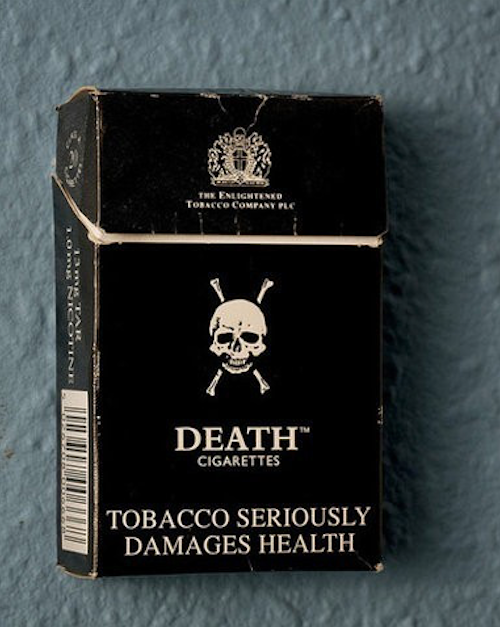
I missed my Amtrak in New York the other day and I was pretty pissed. Not because I had to wait around, but because my fam was planning to pick me up at the train station - and they didn't want to wait around. So I was like, fuck it, I’m going to go smoke a cigarette (despite having quit a year ago).


I sat outside for about 45 minutes and didn't see a single smoker. I don't understand what is happening in the world. What alternate reality am I living in.
I used to smoke a lot of cigarettes. I liked them; the only reason I quit was because I found myself in stages of pre-hypertension. Inflammation, modification of lipids, and vasomotor dysfunction are integral components for the initiation and development of atherosclerosis. Atherosclerosis is the slow and steady process by which the arteries are narrowed and blocked, restricting blood flow. It is a common cause of heart attacks, strokes, and other vascular diseases. Impairment of vasodilatory function is one of the earliest manifestations of atherosclerotic changes in a vessel. I was at that point. So, I was like yo I guess I gotta quit.

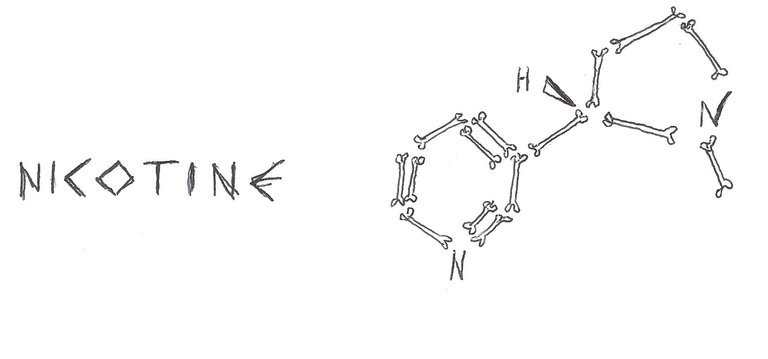
Nicotine
Nicotine is an alkaloid derived from nightshades (Solanaceae), notably tobacco and coca. Small quantities can even be found in tomatoes, potatoes, eggplants, etc. In tobacco, nicotine accounts for approx. 0.6-3% of dry weight. To put this shit in perspective, an average cigarette delivers roughly 1 mg of nicotine, but they generally range from 0.1 to 2.8 milligrams.
Biosynthesis occurs in the roots and spreads/accumulates in the leaves. It is a vantiherbivore in function, meaning that it is a neurotoxin effective in insects. Back in the day (I’m not sure when but,) nicotine was used as a insecticide. If you’ve never smoked before - nicotine primarily acts as a stimulant, helps you shit with your morning cup of coffee, which is why it is responsible for development of dependence in tobacco smoking (not just because of the shitting). I’m sure you know of someone who has found it impossible to quit. Quitting is definitely hard, but yo you just gotta disassociate with yourself a little bit and just do it. So, how does this actually work…
Pharmacology in the CNS
The moment nicotine enters the body, it is quickly distributed throughout the bloodstream; after inhalation it takes about seven seconds to cross the blood brain barrier with ease. Mechanistically, nicotine acts by binding to nicotinic receptors; as a result, dopamine levels are increased in the brain's reward circuit. More particularly, tobacco smoke inhibits monoamine oxidase, which is an enzyme that breaks down dopamine - therefore its presence remains for a longer duration. Nicotine activates the sympathetic nervous system, leading to epinephrine release by the adrenal medulla. This occurs via acetylcholine released by preganglionic sympathetic fibers of splanchnic nerves, which initiates release of epinephrine and norepinephrine into the bloodstream. When you smoke a cigarette, nicotine rich blood passes from the lungs to the brain, which initiates release of many chemical messengers; here are some primary ones:
(Some but not all) Chemies drawn by me

There is much to say about dopamine. It is a neurotransmitter released within dopamine pathways in the brain, one of which dictates motivation in reward motivated behaviors. Pop culture often depicts dopamine as the primary feel-good chemical messenger, however modern literature suggests dopamine mediates desire and motivation over pleasure.

Acetylcholine is essentially a chemical that motor neurons of the nervous system release to active muscle movement. It is both a neurotransmitter and neuromodulator that plays a role in many common drug effects given their cholinergic transmission alterations.
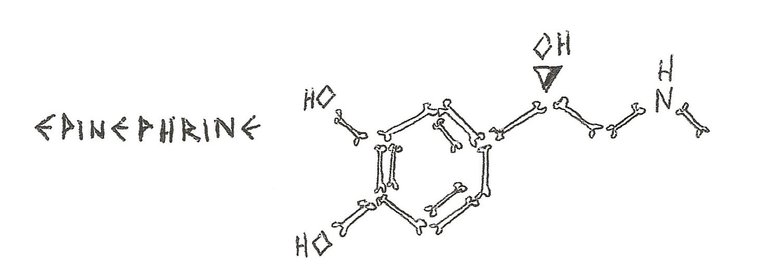
Epinephrine, more commonly referred to as adrenaline, is an essential contributor to the fight or flight response via blood flow initiation. Epinephrine differs from norepinephrine in that it is only released during times of stress. It is an effective anti-histamine and treatment for shock.
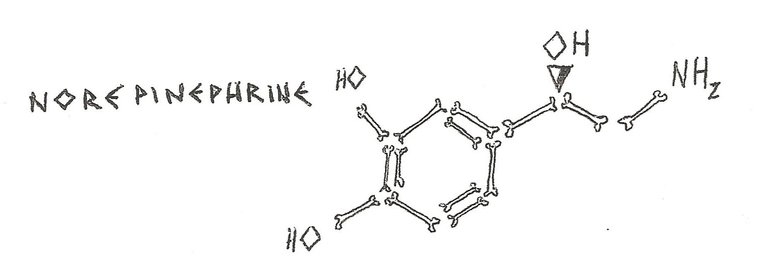
Norepinephrine is an important component in the flight or flight response. It works by increasing arousal and alertness, promoting vigilance, and enhancing formation and retrieval of memory. It also increases restlessness and anxiety. It essentially works to raise the heart rate and modulate blood pressure.
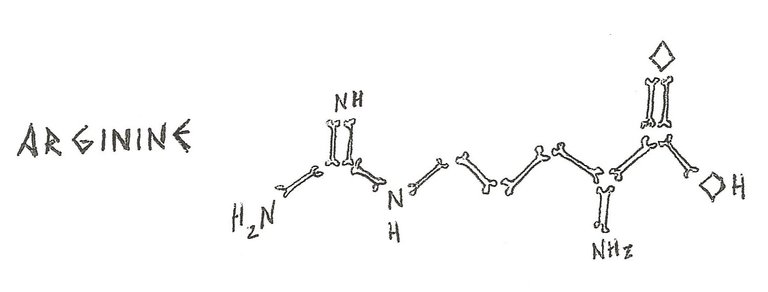
Arginine is an amino acid that is utilized in protein synthesis. It is relevant here in that it is a precursor for the nitric oxide synthesis; it is a regulator of blood pressure. It also plays a role in cell division and immune function.
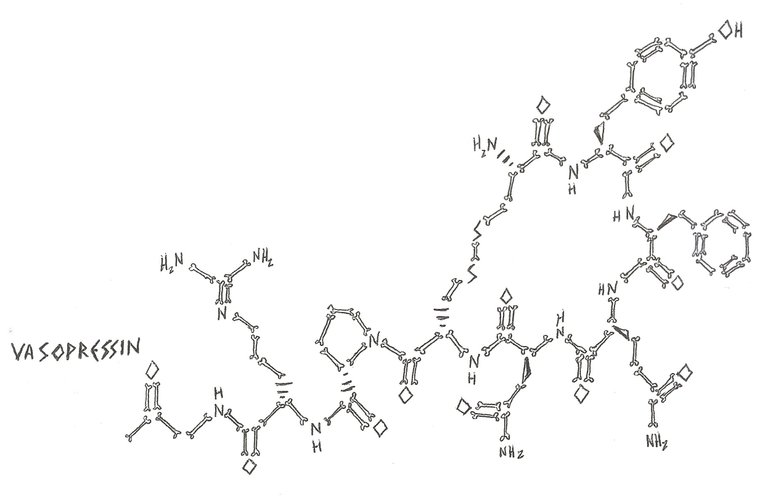
In this particular case, the importance of vasopressin is its ability to increase peripheral vascular resistance; it raises arterial blood pressure. There is speculation that vasopressin plays a role in social behavior and sexual motivation.
Nicotine is very effective; it has the ability to enhance concentration and learning via increased acetylcholine concentrations. This increase, along with the increase of norepinephrine, also assists in enhanced alertness. Greater norepinephrine release also results in increased arousal. Pain is reduced via increased endorphins and acetylcholine, subsequently working as an anti-anxiety.
Dose Response
At low doses, nicotine has the potential to enhance the actions of norepinephrine and dopamine in the brain, causing a drug effect typical of those of psychostimulants. When administered at higher doses, nicotine enhances the effect of opiate activity, producing a calming, pain-killing effect. This is what makes nicotine a very unique drug; its profile can change from stimulant to sedative depending on its dose. A guy by the name of Stanley Einstein performed a simple study (1989) that had shown that when smokers want to achieve a stimulating effect, short quick puffs are successful; they produce a low level blood nicotine which stimulates nerve transmission. When they wish to relax, deep puffs are effective in producing a high level of blood nicotine, which contrarily depresses passage of nerve impulses resulting in a sedative effect.

Addiction
Many studies go as far as to suggest that nicotine is more addictive than cocaine and heroin, which is some bullshit ? in my opinion. However, one interesting finding that seems to be persistent throughout literature is that chronic nicotine treatment has an opposite effect (in comparison to cocaine and heroin) on reward thresholds; like other physically addictive drugs, nicotine causes down-regulation of the production of dopamine and other stimulatory neurotransmitters in attempt to compensate for artificial stimulation. Smoking cigarettes decreases the sensitivity of nicotinic acetylcholine receptors as a compensatory mechanism. As a result, the brain in turn upregulates the number of receptors, overlapping its regulatory effects with compensatory mechanisms meant to counteract other compensatory mechanisms… In short, the net effect is an increase in reward pathway sensitivity, opposite of other drugs of abuse (namely cocaine and heroin, which reduce reward pathway sensitivity).
Compensation in addiction is a fascinating brain mechanism. For example, if you smoke cigarettes every time you get into the car, your brain registers the environmental que of the carseat. Once you get in the car, down-regulation of dopamine production occurs in preparation for the supplemental dopaminergic release caused my the usual cigarette.
This neuronal brain alteration persists for months after administration ceases. However, due to an increase in reward pathway sensitivity, nicotine withdrawal is relatively mild compared to ethanol or heroin withdrawal.
I guess that's all I have to say about this for now. I don't expect many people to find this sort of post particularly interesting. Either way, it's always nice to dedicate my free time to neuroscience related stuff. Until next time.

Cig = bad
Fuck cigs. Really informative and well presented. Thank you <3
Some paid blood donors smoke to Increase their Packed cell volumes which often passes unnoticed.
The mechanism of This falsely raised PCV is not totally clear yet.
Cigs are still bad despite the good feeling.
Congratulations @samoasilk! You have completed the following achievement on Steemit and have been rewarded with new badge(s) :
Click on the badge to view your Board of Honor.
If you no longer want to receive notifications, reply to this comment with the word
STOPTo support your work, I also upvoted your post!
Do not miss the last post from @steemitboard:
SteemitBoard World Cup Contest - The results, the winners and the prizes
Some images in this post are copyright-protected. It is kindly advised that you edit your post and replace them with images under the appropriate license. For more information click on the link below.
https://steemit.com/steemstem/@steemstem/guidelines-on-copyright-standards-in-steemstem
The first and last photo do not belong to me, I will edit that later. Thanx bot